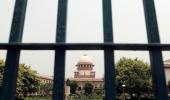The Gujarat Police have arrested former IPS officer Sanjiv Bhatt through a transfer warrant in a case of conspiring to falsely implicate innocent people in the 2002 communal riots, an official said.

A transfer warrant is procured by a probe agency before taking into custody an accused, who is in prison in another FIR or case. The warrant is then sent to the prison officer concerned to transfer the custody of the accused to the probe agency.
Bhatt is the third accused arrested in the case by a Special Investigation Team of the Gujarat police, after social activist Teesta Setalvad and former state Director General of Police R B Sreekumar.
Bhatt has been lodged at Palanpur jail in Banaskantha district since 2018 in a 27-year-old case in which he is accused of planting narcotics to frame a Rajasthan-based lawyer. During that trial, he was also convicted to life in a custodial death case in Jamnagar.
"We took Sanjiv Bhatt's custody from Palanpur jail on a transfer warrant and formally arrested him on Tuesday evening," Ahmedabad Crime Branch's Deputy Commissioner of Police Chaitanya Mandlik said.
Mandlik is one of the members of the SIT formed by the Gujarat government last month to probe the roles of Bhatt, Sreekumar and Setalvad in a case of fabricating evidence in various cases related to the post-Godhra riots of 2002.
Setalvad and Sreekumar were arrested by the crime branch last month and they are currently behind bars.
The two were arrested after the Supreme Court upheld the clean chit given by an SIT to the then Gujarat chief minister Narendra Modi in the 2002 riots cases.
An FIR was registered by the crime branch against the three persons under Indian Penal Code Sections 468 (forgery for purpose of cheating), 471 (forgery), 194 (giving or fabricating false evidence with intent to procure conviction of capital offence), 211 (institute criminal proceedings to cause injury), and 120 (B) (criminal conspiracy).
They are accused of abusing the process of law by conspiring to fabricate evidence in an attempt to frame innocent people, for an offence punishable with capital punishment.










